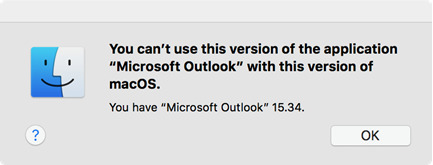A support document published by Microsoft, and some AppleInsider testing, shows that while the newer versions of the office productivity suite will mostly work with High Sierra now, the current version does not — and older versions are getting left behind.
In the support document, published shortly after the reveal of High Sierra, Microsoft declares that while the Office 2016 suite of applications from unreleased version 15.35 and later do work, users will still have to endure problems while waiting for a future update. According to Microsoft, "not all Office functionality may be available" and stability problems may manifest where "apps unexpectedly quit."
Without delving into specific reasons why, Microsoft strongly recommends that users back up existing data before trying the software. The company is requesting that users send feedback if they choose to test High Sierra and Microsoft Office products.
Versions 15.34 — the current version — and earlier are not supported on High Sierra, and users may not be able to launch the apps at all, according to Microsoft. The 15.34 update was released on May 16
Microsoft notes in the same memorandum that Office for Mac 2011 "have not been tested" and "no formal support for this configuration will be provided." Office for Mac 2011 will also cease all support from Microsoft on October 10, 2017 and no further updates in any form will be provided after that date.
AppleInsider tested the 15.34 version and found that they appear to launch and run for a period of time, but with notably slower speeds across the board. Furthermore, the apps quit unexpectedly fairly often during use.
The same issues manifested in a Mac with High Sierra that was not migrated to APFS, eliminating that as a primary source of the errors and crashing.
The latest Office for Mac 2011 from April, version 14.7.3, was examined, and was found to be in a worse state following the High Sierra update. Crashing was even more frequent than in the Office for Mac 2016, not even accounting for a number of other user interface oddities spanning the entire suite. A standard troubleshooting step for Microsoft Office applications is to uninstall and reinstall the suite. Neither the 2011 nor the 2016 versions were any better after a complete delete and reinstall.
Both the 2011 and 2016 versions of Office were usable prior to the High Sierra update. AppleInsider's testing found the 2016 suite to to be functional for the cautious under 15.34, and 2011 to be not reliable at all under High Sierra.
 Mike Wuerthele
Mike Wuerthele







-m.jpg)






 Charles Martin
Charles Martin
 Malcolm Owen
Malcolm Owen
 William Gallagher
William Gallagher

 Christine McKee
Christine McKee
 Wesley Hilliard
Wesley Hilliard

 Andrew Orr
Andrew Orr








45 Comments
I wonder how much of this because there are just plenty of bugs that need to be worked out of High Sierra versus it being a major change that will require developers to update their apps. I hope it's the former. I have plenty of old apps that still work fine on Sierra that I have no particular interest in upgrading.
The problem lies with Microsoft and their Xamarin junk that is used as middleware layer. Propper written native apps wont have any issues.
Increasingly hard to find people who still use Office.